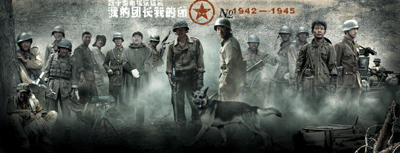
|
CHINA> Focus
 |
|
History comes alive in "My Chief and My Regiment"
By Zhang Xi (chinadaily.com.cn)
Updated: 2009-03-20 10:21 About 12 shirtless Chinese men jumped into gasoline barrels filled with black oil to make their bodies dark to make their way undetected into the Myanmar virgin forest at night. There they sneak up on several Japanese soldiers and shot them, as they had not noticed these men who perfectly blended themselves with the dark atmosphere. This is a battle scene in the latest popular drama on the Chinese small screen called "My Chief and My Regiment". This drama adopted from a same titled novel offers a great chance for the Chinese to learn more about the wars that broke out during China's Resistance Against Japan. Narrated by a main character named Meng Fanliao (played by Zhang Yi), the drama reveals the battle conditions between the Kuomintang expedition army and the Japanese invaders in 1942. Long Wenzhang, the lead character, is a self-claimed leader who organizes a group of defeated Chinese soldiers in then Burma (now Myanmar) to fight against the Japanese invaders. Long was later appointed as a real commander to lead those once desperate and pessimistic soldiers to fight bravely as advance forces who sacrificed their lives at the China-Burma border.
 The poster of "My Chief and My Regiment"
The story tries to show the experiences of the China Expedition Army soldiers, who first came to then Burma at the request of the British colonial government, to join the Allies to regain China's only lifeline for international supplies from Japanese armies. The road from China's Kunming to Burma's Lashio was cut off by the Japanese who took control of Burma in 1942. Tragically, the attempt failed and 50,000 Chinese soldiers died in battles. In order to truly recreate history, Lan Xiaolong, the screenwriter of "My Chief and My Regiment" and author of the novel claimed that he read tons of history books and kept contacting some of the surviving soldiers in the China Expedition Army as he wrote the novel. Lan said he was overwhelmed when he visited the National Cemetery in Tengchong, Yunnan province, the biggest one of its kind where some 8,000 Chinese and American fallen soldiers are honored for their efforts in trying to recovering the city from Japanese troops in 1945. The 43-epsiode drama garnered lots of attention even before the first scenes were shot, thanks mostly to the popularity of the novel. But another even more important reason is the participation of the same cast and crew of a 2007 unexpectedly successful TV show called "Soldiers' Sortie", which was adopted from one of Lan's previous novels. |